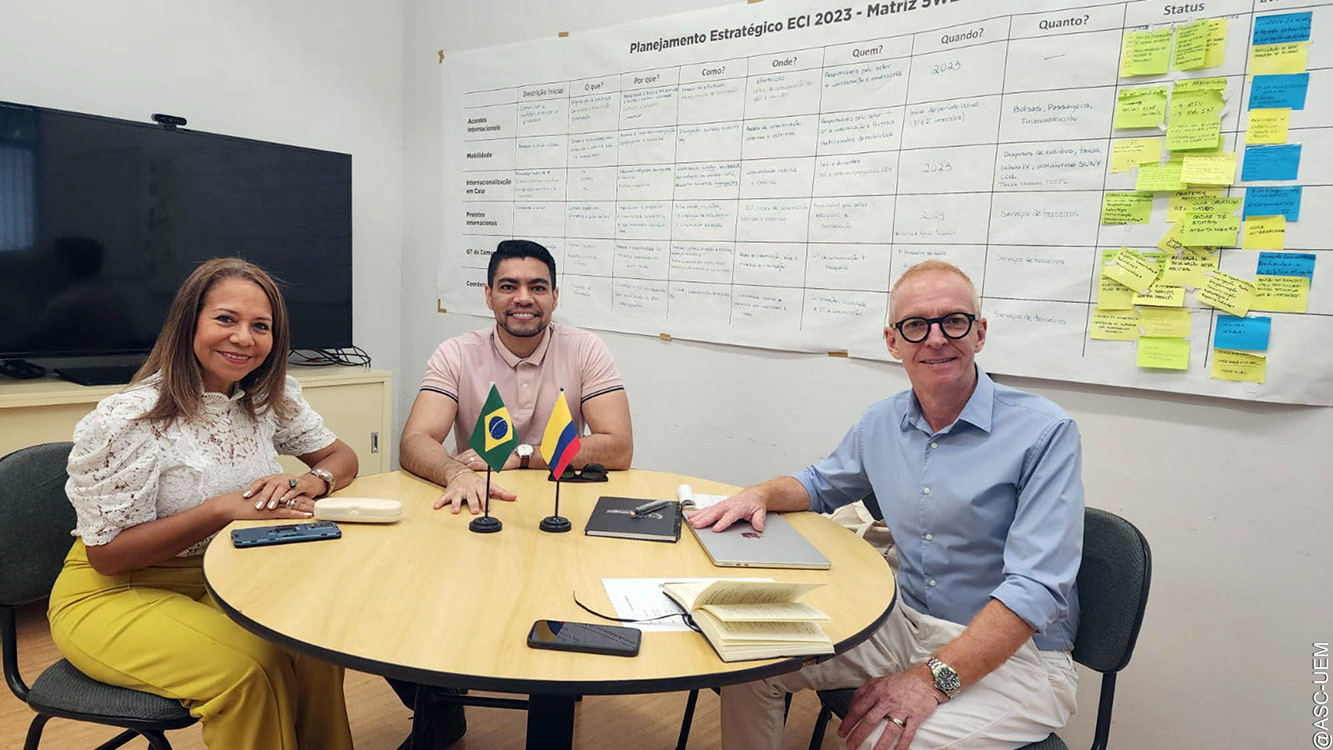Professor Zuleima Cogollo had the opportunity to get to know the Brazilian health system through the Marca program
This week, the State University of Maringá (UEM), through the International Cooperation Office (ECI), received a visit from the nurse and public services administrator Professor Zuleima Cogollo, PhD, head of the Nursing Department at the University of Cartagena in Colombia.
The specialist in public health and mental health came to Brazil with funds from the Regional Academic Mobility Program in Accredited Courses (Programa de Mobilidade Acadêmica Regional em Cursos Acreditados - Marca), which is supported by the Ministry of Education (Ministério da Educação - MEC) and the Coordination for the Improvement of Higher Education Personnel (Coordenação de Aperfeiçoamento de Pessoal de Nível Superior - Capes). The theme of the project approved by UEM’s Nursing Department under the Marca program is "Leadership in Nursing" (Liderança em Enfermagem).
This Friday, at 2pm, the professor will give a lecture in the auditorium of Building 002, for undergraduate and graduate nursing students. Cogollo will talk about leadership in nursing, especially how nurses can be leaders in the area of research. "To be a leader, we first have to start from the passion and enthusiasm we have for our profession. From there, we have to be empowered, decisive and we also have to make appropriate decisions through study. Knowledge definitely opens doors for us and it is what allows us to empower ourselves," she concludes.
Learning
During the week, the Colombian professor saw many similarities between the health systems in Brazil and Colombia, but pointed to the community health agents as an important differentiator in Brazil. For her, this primary care service is fundamental, as it establishes a direct link with the community, where it is possible to gather information and detect the real needs of the population. "We have lost this service in our health system, but we hope that the new government will once again implement this human resource, which in fact favors the health of Colombians," she glimpses.
According to the nursing professor and ECI team member Mayckel Barreto, the Marca Program includes academic mobility scholarships for students and teachers of Agronomy, Nursing, Civil Engineering and Food Engineering, courses accredited by the Regional Accreditation System for Undergraduate Courses in Mercosur and Associated States (Sistema de Acreditação Regional de Cursos de Graduação do Mercosul e Estados Associados - Arcu-Sur), due to their high level of quality.
In 2021, the courses participated in a public call for proposals and were included in the program for three years, from 2022 to 2024. Since 2022, there have been exchanges of students and teachers between the universities. "Currently, in Nursing, we have a student from the University of Cartagena who is here with us for three months. She has already done some disciplines and internships and is now leaving on November 30th. We've also sent one of our students there, who has just returned. And next Saturday, our nursing teacher, Sonia Marcon, is going to Colombia," says Barreto.
For Cogollo, as we live in a globalized world, exchanges between universities are important for the academic community, because they open the minds of future professionals and teachers, since they can get to know the health structures of other countries. "For the university it is fabulous, because it improves its internationalization indicators, a requirement for accrediting the institution, nationally or internationally. As well as the professional gain, the students are enriched culturally in various areas," she said.
Barreto adds that, in addition to internationalization - which makes UEM recognized in Latin America and abroad, as a powerful, quality university - the gain for everyone involved is immeasurable. "For example, the student from Colombia, Maria Camila, is in two internship groups, so our students develop cultural and linguistic proficiency. In the gerontology internship, she has been teaching our elderly people how to make recipes with more spice and less salt in order to control their blood pressure. Likewise, our student who went there also develops these skills among her colleagues. So there are many tangible benefits to be gained from carrying out this project, especially in the sense of professional enrichment - we are training nurses with a broader vision," Barreto concludes.

